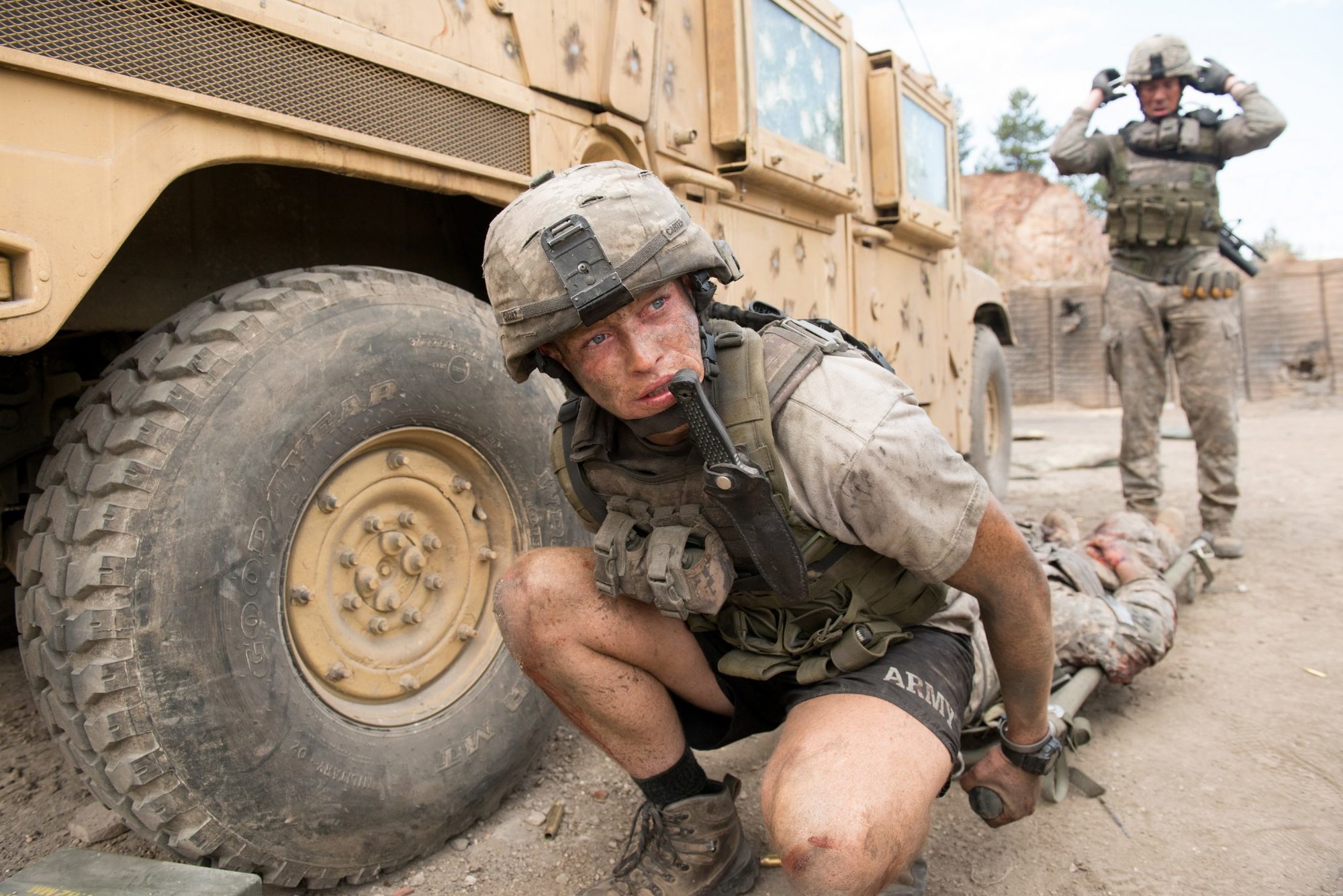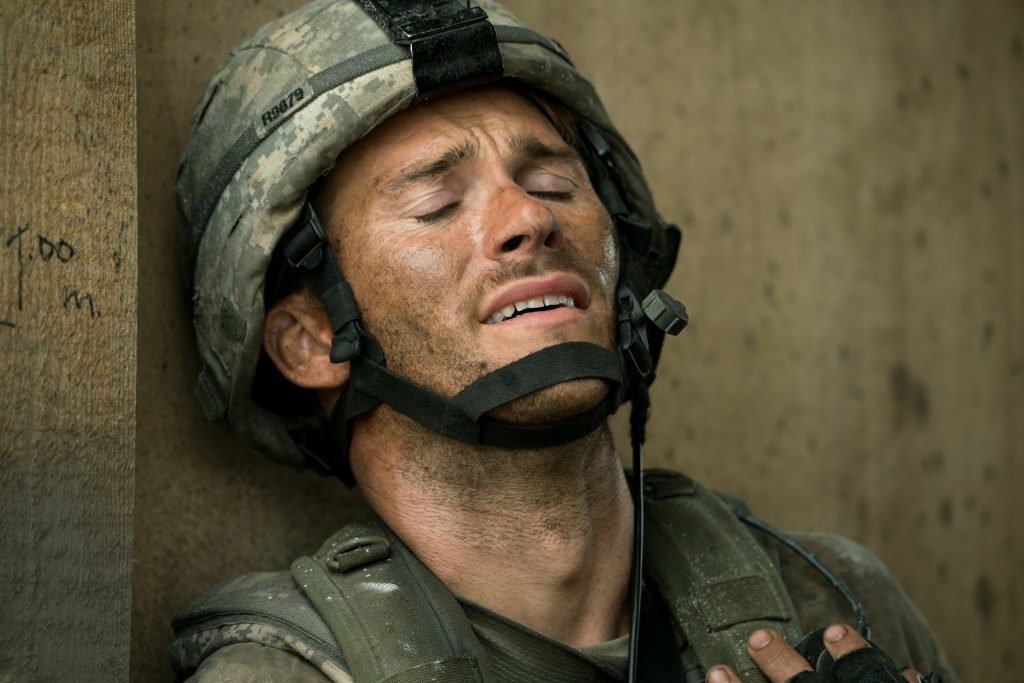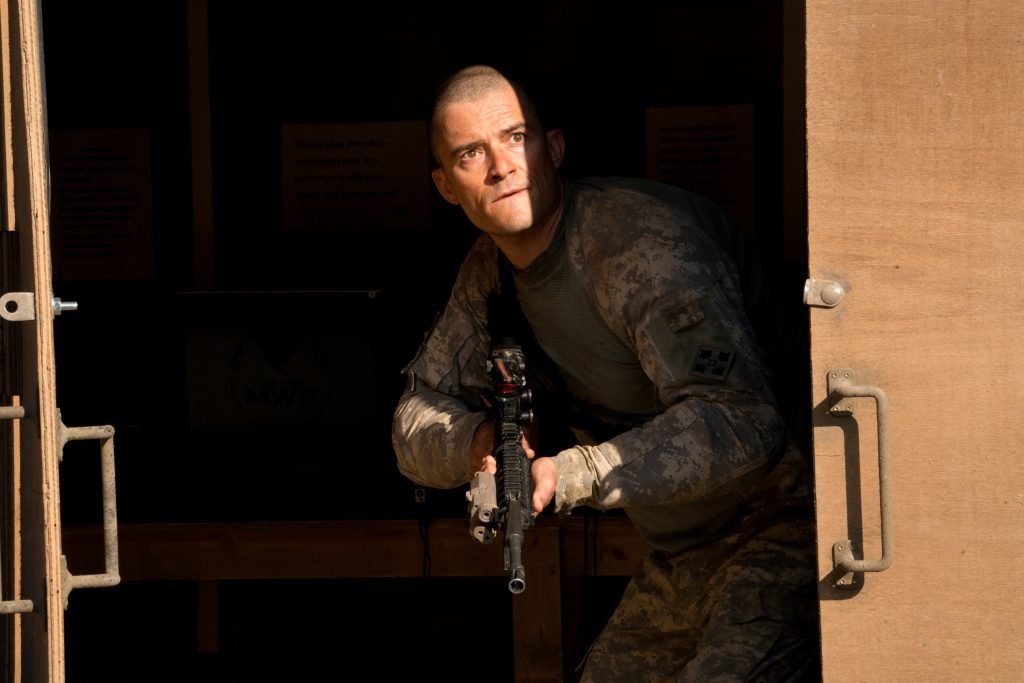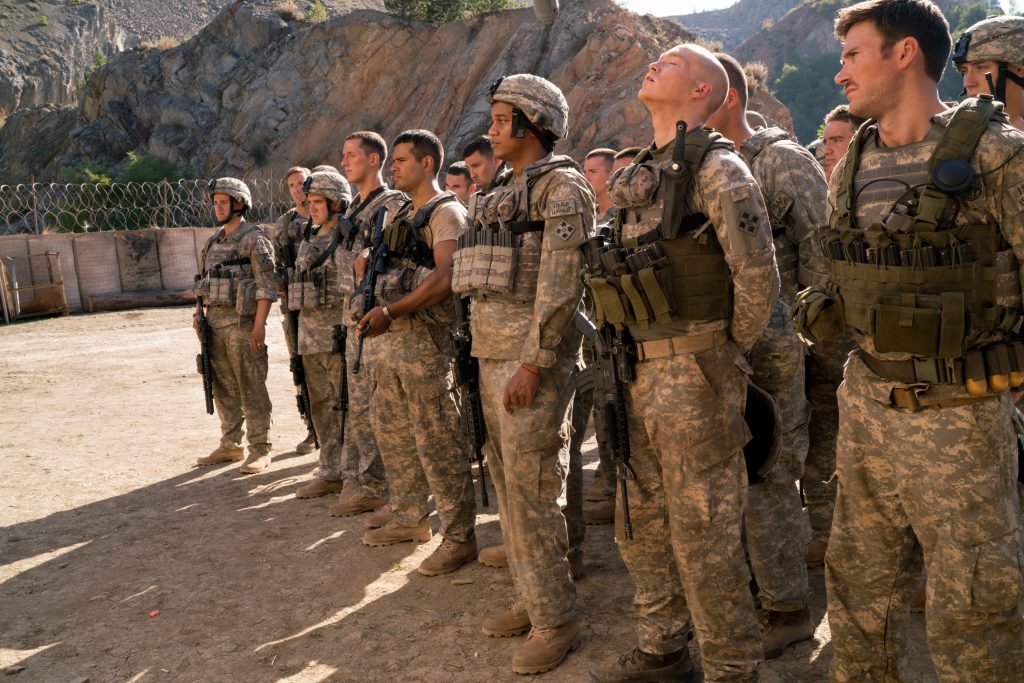
Caleb Landry Jones in ‘The Outpost.’ Movie still courtesy of Screen Media.
“The Outpost” — directed by Rod Lurie and starring Scott Eastwood, Caleb Landry Jones, and Orlando Bloom — is a film depicting the true events of the Battle of Kamdesh, which occurred on Oct 3, 2009. The battle was ferocious — soldiers holed up in the remote Combat Outpost Keating attempted to fight off waves of Taliban pouring down the surrounding mountains. Eventually the COP was overrun, but the fight continued through hooches and around hesco barriers.
As with many harrowing battles, there were great losses and great acts of heroism. Eight U.S. soldiers were killed and another 27 wounded (plus eight Afghan soldiers wounded). On top of the Bronze Stars, Silver Stars, and Distinguished Service Crosses with “V” devices, Medals of Honor were awarded to Clint Romesha and Ty Carter for their actions under fire. You can also read about these events in “Red Platoon: A True Story of American Valor,” written by Romesha.

These are the raw numbers, the factual reporting that gives us a bullet-point view of something that was, in truth, inundated in some of the best and worst moments human beings can experience.
It’s impossible to know exactly what it was like on the ground at COP Keating in early October 2009 unless you were a soldier there. However, insight can be gleaned by listening to their accounts, reading associated texts and award citations, and now through this film.
The most striking aspect of “The Outpost” is the sense of realism. This extends far beyond trigger discipline and magazine changes, it’s an integral part of the movie at every level — from the weapons handling to the banter to the feeling of sheer chaos when bullets start tearing through the air.
Jariko Denman, a retired U.S. Army Ranger, worked on the film as the technical advisor and associate producer alongside former U.S. Navy SEAL Ray Mendoza, both working out of War Office Productions.
“That’s the world you’re in, that world has to be correct or else everything else rings hollow,” Denman told Coffee or Die in a recent phone interview, referencing the attention to detail in the film. “If you’re making a movie about south-central Los Angeles and the guys have Canadian accents, people won’t believe it. [Realism] lends itself to authenticity.”
From the start, it’s clear that there is something unique about the portrayal of the relationships between the soldiers in “The Outpost.” Their humor is dark, which brings levity to a dire situation. They have real conflict among one another, and yet they unite in a single mission. If nothing else, they are first and foremost concerned with how well everyone can do their jobs — respect is directly proportional to whether that person can keep himself and the others alive. Not only does “The Outpost” illustrate these dynamics, it invites the audience to step inside that world and share the thoughts and feelings of these soldiers on the ground.
Denman helped bring that “everyday living” on COP Keating to life with his breadth of military experience, but he credits Hank Hughes with the levels of success they were able to achieve. Each branch and unit has its differences, and not only is Hughes an Army veteran, he was also stationed at COP Keating at one point. Denman leaned on him to help develop the nuance that only someone with firsthand experience can offer.

Daniel Rodriguez, who was on the ground during the events depicted, was also involved in the production, and his insight proved invaluable.
That realism extends from the brotherhood to the battlefield. When the explosions start shaking the earth, the audience feels it. When soldiers and Taliban are trading rounds, the chaos is palpable. Lurie and his crew were able to take some pretty horrific events and recreate them on film — watching this, one can understand how combat is not kind or forgiving, nor does it offer reprieve to whatever “main character” is on screen (because, in reality, everyone is their own main character).
The acts of immense heroism aren’t announced with a golden horn, nor are they laden with epic shots in ultra-slow motion. The protagonists are just as confused and overwhelmed by the chaos as everyone else, and they struggle to make sense of a world exploding around them. Even when they take initiative and save lives, they are scrambling through the dirt to save their friends — often to no avail.
With this technique, the film accomplishes something rarely accomplished in war films: it walks the tedious line of portraying real, honest-to-god heroism on the battlefield while still grouping the main characters together with everyone else. They are not action heroes, they are one of many similar soldiers, with the (very significant) exception of an act of bravery during a few moments in the midst of many others. This also helps civilians understand why a medal might not be of utmost importance to some of these men, unless it sheds light on the fallen and those who fought next to them.
Acting can be a physical job as much as an emotional one. According to Denman, Lurie went into “The Outpost” wanting longer, continuous shots instead of cutting quickly between action sequences and piecing them together. For Denman, this meant he wasn’t able to rely on the actors parroting his every move — he had to show them the ropes of soldiering in the allotted time.
“Once I have the tangible ergonomics hammered in, then I really try to show them the mindset you’re in as a gunfighter — which is aggressive,” Denman said. He described scenes that would take an entire day to shoot, and the whole crew would only have three or four chances to get it right. If there was a weapons malfunction, if they emptied their magazines, they would have to fight through it for the sake of the shot. “That [aggressive] mindset is what will carry them through when something happens that they didn’t exactly see in training — but they’ll know that when in doubt, be aggressive.”

Denman said that while it doesn’t make for as fun of a shoot, it enhances the authenticity of the entire production.
The overarching success of “The Outpost” is how the realism of the relationships and the realism of combat are not separate from one another. Action films often offer moments of banter followed by moments of combat. The prior humanizes the soldiers, the latter shows the realities they face. “The Outpost” takes it a step further by showing how those worlds are one and the same. How soldiers speak to each other, how they fight alongside each other, how they feel when they call home, how they spend their free time, how they train — it’s all the same world, the same remote COP in the mountains crawling with Taliban.
There is nothing “pure” about the realities of combat, and the visuals of “The Outpost” are as gritty and heart-wrenching as they come. However, in portraying the bloodshed, the relationships of the men on the ground, and the overlap between them, Lurie has created a world that feels pure in its authenticity. It stays focused on the men and the events surrounding the battle, and it doesn’t deviate into politics or attempt to romanticize or diminish combat.
It simply tells the story of the Battle of Kamdesh and the men who fought it.

Luke is the author of two war poetry books, The Gun and the Scythe and A Moment of Violence, and a post-apocalyptic novel, The First Marauder. He grew up in Pakistan and Thailand as the son of aid workers. Later, he served as an Army Ranger and deployed to Afghanistan on four combat deployments. Now he owns and operates Four Hawk Media, a social media-focused marketing company.
BRCC and Bad Moon Print Press team up for an exclusive, limited-edition T-shirt design!
BRCC partners with Team Room Design for an exclusive T-shirt release!
Thirty Seconds Out has partnered with BRCC for an exclusive shirt design invoking the God of Winter.
Lucas O'Hara of Grizzly Forge has teamed up with BRCC for a badass, exclusive Shirt Club T-shirt design featuring his most popular knife and tiomahawk.
Coffee or Die sits down with one of the graphic designers behind Black Rifle Coffee's signature look and vibe.
Biden will award the Medal of Honor to a Vietnam War Army helicopter pilot who risked his life to save a reconnaissance team from almost certain death.
Ever wonder how much Jack Mandaville would f*ck sh*t up if he went back in time? The American Revolution didn't even see him coming.
A nearly 200-year-old West Point time capsule that at first appeared to yield little more than dust contains hidden treasure, the US Military Academy said.












